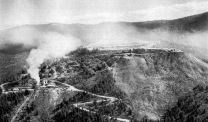Johnson & Johnson Agrees to Pay $8.9 Billion to Settle Talc Lawsuits
Legislation & LitigationWritten by Michelle Whitmer | Edited By Walter Pacheco

Johnson & Johnson has announced it will pay $8.9 billion to settle tens of thousands of talcum powder lawsuits alleging the pharma giant’s talc products caused cancer.
This announcement comes days after the U.S. Court of Appeals for the 3rd Circuit denied the company’s request to delay a bankruptcy decision for its subsidiary, LTL Management, and ordered a U.S. bankruptcy judge to dismiss the case.
Late Tuesday, LTL Management filed for bankruptcy protection for a second time to seek approval for a reorganization plan that will “equitably and efficiently” resolve litigation, Johnson & Johnson wrote in an April 4 statement.
The proposal intends to resolve all current and future talc claims and is nearly five times its earlier proposed offer of $2 billion.
Johnson & Johnson: Claims ‘Lack Scientific Merit’
Reuters reported Wednesday that under the terms of the new proposal, plaintiffs diagnosed with cancer before April 1, 2023, would be paid from a bankruptcy trust within one year of approval of the Chapter 11 plan. Plaintiffs diagnosed later will have access to money set aside in a trust for the next quarter century.
The company said it has support from 60,000 claimants for the resolution.
Despite the new settlement amount, the company continues to deny any wrongdoing and maintains its products are safe. Asbestos-contaminated talc products sold by Johnson & Johnson and other manufacturers have led to mesothelioma and ovarian cancer.
“The Company continues to believe that these claims are specious and lack scientific merit,” said Erik Haas, Worldwide Vice President of Litigation at Johnson & Johnson. “However, as the Bankruptcy Court recognized, resolving these cases in the tort system would take decades and impose significant costs on LTL and the system, with most claimants never receiving any compensation.”
The settlement, Haas said, would allow claimants to be compensated in a more timely manner.
Court Ruling Paves Way for Litigation to Continue
The new proposal is the latest move by a company that has faced mounting personal injury lawsuits. More than 38,000 lawsuits have been filed against Johnson & Johnson
Johnson & Johnson attempted a “Texas two-step” bankruptcy maneuver, which would have funneled the talc cases onto a subsidiary company that immediately filed for bankruptcy. The subsidiary – LTL Management – initially filed for bankruptcy protection in October 2021.
In January, the court of appeals denied the bankruptcy protection because, it said, Johnson & Johnson and LTL were not in “financial distress.” In late March the court ordered the bankruptcy case to be dismissed.
“Our decision dismisses the bankruptcy filing of a company created to file for bankruptcy,” Judge Thomas Ambro wrote in his decision March 31. “It restricts J&J’s ability to move thousands of claims out of trial courts and into bankruptcy court so they may be resolved, in J&J’s words, ‘equitably’ and ‘efficiently.’”
Asbestos lawyers are actively taking on new cases.
Johnson & Johnson Denies Products Contain Asbestos
A 2018 investigative report by Reuters found that Johnson & Johnson knew for decades its products contained asbestos and failed to warn the public.
Talc and asbestos are two minerals that naturally form together and are similar in composition. Talc deposits are commonly contaminated with asbestos and asbestos-like fibers.
Journalists pored over thousands of pages of company documents, memos, internal reports and confidential documents, as well as court files and testimony, to find that Johnson & Johnson’s raw talc and finished powders sometimes tested positive for asbestos.
“Company executives, mine managers, scientists, doctors and lawyers fretted over the problem and how to address it while failing to disclose it to regulators or the public,” the Reuters report stated.
In 2019, Johnson & Johnson doubled down on its safety messaging, stating its talc products were not harmful and producing testing results showing it was safe. The following year it pulled talc baby powder from shelves in the U.S. and Canada due to what it called “misinformation” about the product and litigious advertising.
Finally, in August 2022, Johnson & Johnson announced it planned to pull its talc baby powder products worldwide in 2023 and shift to a cornstarch-based baby powder.






